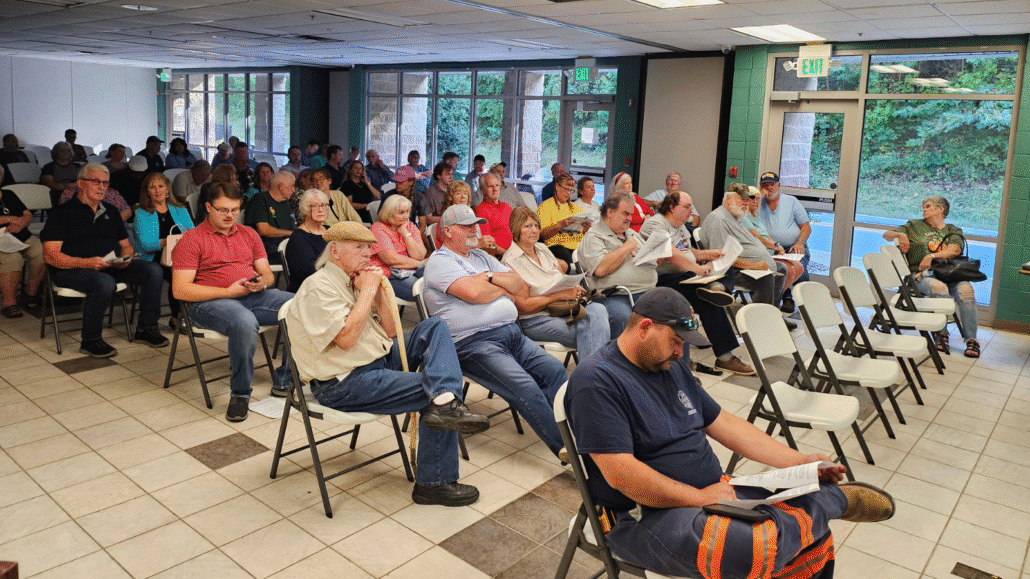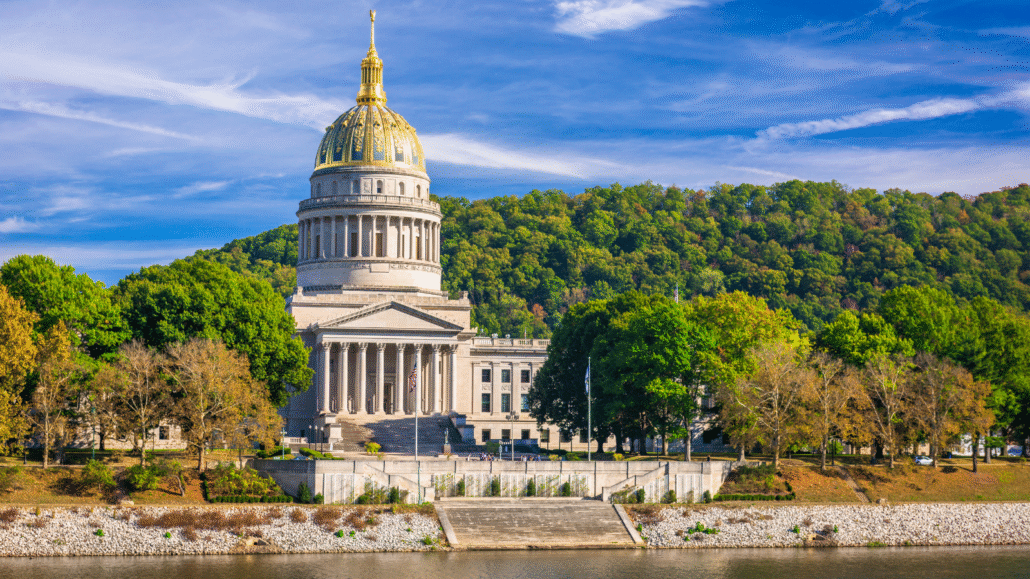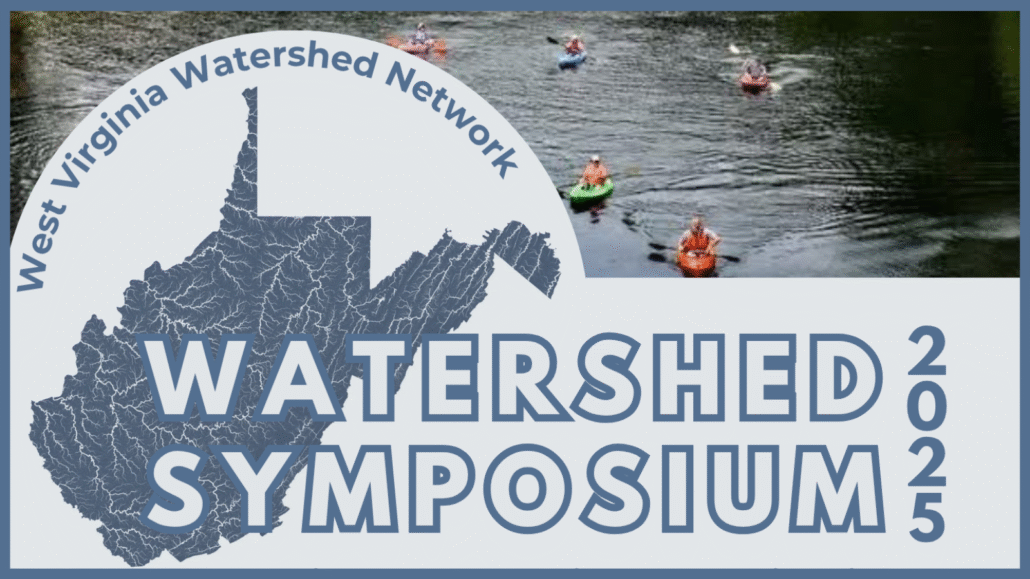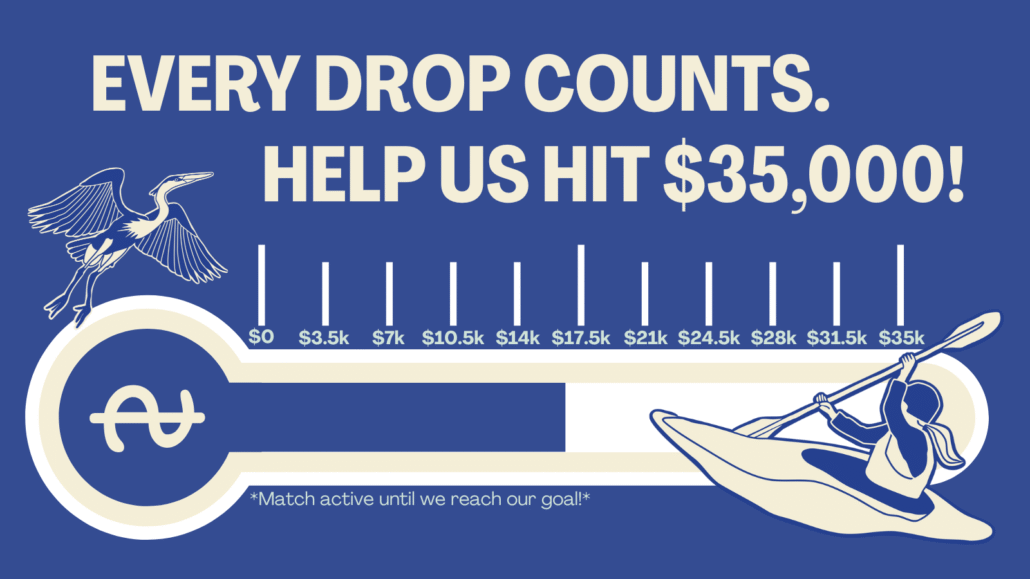Updates from WV Rivers Coalition
September 2025
It’s Source Water Protection Week!
Safe water for West Virginia starts here — in the creeks, rivers, and streams that sustain us.
Did you know the best way to ensure you can trust what comes out of your tap is to protect the sources of drinking water — our rivers, streams, lakes, reservoirs, and groundwater? That’s the focus of Source Water Protection Week, a national effort to raise awareness about keeping drinking water safe.
About 85% of people in the U.S. get their drinking water from community water systems, while the rest rely on private wells, cisterns, or springs. West Virginians follow a similar pattern, and because of our state’s reliance on surface water, protecting source water is especially important here at home.
After a chemical used to clean coal leaked from an Above-ground Storage Tank into the Elk River in 2014, West Virginia took action by requiring public water systems to create Source Water Protection Plans (SWPPs). These plans identify potential threats, outline strategies for responding to contamination events, and detail how communities will be kept safe and informed. Plans are regularly updated, and community input is vital in shaping them.
Current challenges like PFAS contamination, fossil fuel development, chemical industry pollution, and even new pressures from climate change and large industrial water users make source water protection more urgent than ever.
In the September e-news edition, we’re putting a focus on protecting our water at the source and ways to take action with WV Rivers Coalition.
Community Voices at the Table
A packed room at Larry Joe Harless Community Center in Gilbert, WV, where community members brought questions and concerns forward about permits for the Adams Fork Data Centers.
Protecting clean water and healthy communities doesn’t happen behind closed doors, it happens when community voices are part of the public record. Across the state, WV Rivers is helping connect people with opportunities to show up, ask questions, and call for accountability on projects that could impact our air, water, and health.
Recently, we joined a packed room of community members in Mingo County for a DEP public hearing on the proposed data centers in the county. Senior Scientist Than Hitt and our Southern WV Coordinator teamed up to create a resource on the project’s water impacts, particularly its plan to withdraw water from underground mine pools. Currently, there are no permits and minimal regulations governing water withdrawals for facilities like this. Facilities categorized as a large quantity use must simply report how much water they use annually. Community members used WV Rivers’ handout to ask informed questions and ensure their concerns were part of the record.
DEP has more community meetings and public hearings planned, and we encourage local community members to attend and participate.
In Mason County, DEP’s Division of Air Quality will hold a public meeting on a permit for a proposed biomass facility with a carbon capture unit near Point Pleasant. The meeting will be held on Tuesday, October 7, at 6:00 p.m. at the Mason County Courthouse (200 Sixth Street, Point Pleasant, WV). This meeting is your chance to ask questions and provide comments for the official record. Pre-registration is encouraged but not required.
In the Eastern Panhandle, elevated levels of toxic “forever chemicals” (PFAS) have been detected in the source water that supplies several water systems across Berkeley, Morgan, and Jefferson counties — before the water is even treated. The following systems are impacted:
-
Berkeley County: City of Martinsburg, Department of Veterans Affairs, Rocky Knoll Elementary
-
Morgan County: WV American Water – Apple Orchard Acres
-
Jefferson County: WV American Water – Walnut Grove Utilities, WV American Water – The Mountain Water System, South Jefferson Elementary, Eastern Panhandle Preparatory Academy, Blue Ridge Primary School, Blue Ridge Elementary
To address these risks, DEP is hosting four community meetings on West Virginia’s PFAS Action Plan. Everyone is welcome — come learn how PFAS contamination is being addressed locally and share your concerns. Learn more.
- Harpers Ferry: Monday, Sept. 29, 6–8 p.m. | Clarion Inn
- Charles Town: Tuesday, Sept. 30, 6–8 p.m. | Cool Spring Preserve
- Martinsburg: Wednesday, Oct. 1, 6–8 p.m. | The Holiday Inn
- Berkeley Springs: Thursday, Oct. 2, 6–8 p.m. | The Country Inn
Light refreshments and a $25 Gift Card are provided for community members for their participation in PFAS action planning. No registration required. Just come — and bring a friend!
Environmental Issues Shaping the 2026 Legislative Session
The West Virginia State Capitol in Charleston, WV.
In the last month, several recent news stories have highlighted environmental issues shaping the 2026 West Virginia legislative session, from industrial development and flood protection to water safety and disaster resiliency. Here are some of the stories we’ve been following:
- Data Centers: In addition to the data centers mentioned above, a coalition of environmental groups in Tucker County has appealed DEP’s permit for the gas-fired power plant powering Virginia-based Fundamental Data’s Ridgeline Development. Local residents and advocacy groups say the plant could rival Mount Storm or Mitchell in air pollution.
- Aboveground Storage Tank Act: Lawmakers are reviewing proposals affecting Diversified Energy’s exemptions from protections near public drinking water sources. Debate centers on balancing industry costs with water safety.
- Flood Resiliency in West Virginia: Nearly two decades after the original statewide flood protection plan, the State Resiliency Office remains largely unfunded. Recent floods in Southern and Northern WV killed 12 residents in 2025, highlighting gaps in preparedness. Experts warn climate change will increase future risks.
- Southern West Virginia Water Crisis: In Wyoming County, DEP is moving forward with reclamation at the former Pinnacle Mining Complex after a two-year legal battle, using over $3 million from bonds and settlements to seal mine shafts, manage discharges, and monitor water quality. Residents remain concerned about contamination in Indian Creek. While DEP reports compliance, community members continue to observe odors and bacterial growth, underscoring the need for ongoing oversight.
Why It Matters for 2026: From industrial development and air quality to flood resiliency and safe drinking water, these stories highlight how public input, oversight, and legislative action directly shape West Virginia’s environmental future.
Stay engaged. Sign up to be a District Advocate to take your advocacy further with WV Rivers Coalition. We need your support to schedule meetings with decision-makers, write op-eds, and make our voices heard at the WV State Capitol and beyond. Active participation is essential to protecting our air, water, and communities!
Last Call: WV Watershed Symposium – October 17-18
Join the West Virginia Watershed Network for the 2025 Watershed Symposium.
The West Virginia Watershed Network (WVWN) is hosting the WV Watershed Symposium at Battlers Knob in Philippi, WV.
This statewide, watershed-focused event runs Friday, Oct. 17 (12–4 p.m.) for a networking opportunity on the water, and Saturday, Oct. 18 (9 a.m.–5 p.m.) for a full day of presentations, discussions, and group networking. Topics include restoration projects, effective communication, group marketing, legislative updates, and more. The day will also feature an award ceremony to celebrate watershed accomplishments.
Registration is required. Complete the form to secure your spot.
Not yet part of a watershed group? Now’s a great time to join or start a local group to connect with peers and amplify your impact on West Virginia’s rivers and streams.
Our Team is Growing – Meet Blake!
Our Community Engagement Team at WV Rivers Coalition added a new team member: Blake Flessas!
We’re thrilled to welcome Blake Flessas to the WV Rivers Coalition team as our Northern WV Coordinator.
Ever since childhood, Blake has maintained a deep appreciation for the outdoors and the lessons to be learned there. Their experience attending the Environmental Middle School in Portland, Oregon, led them on a lifelong journey in environmental education. They began with the Outdoor School in Oregon first as a student, then growing into a volunteer, and eventually being hired as teaching staff, curriculum writer, and program coordinator, as well as serving on the advisory board.
Blake holds a BA in Environmental Education from Hampshire College in Massachusetts, where they developed a middle and high school curriculum on environmental justice advocacy for their undergraduate thesis. Blake spent over a decade teaching youth hands-on natural science and leadership in the woods of Oregon, Vermont, and West Virginia.
In addition to this work, Blake takes pride in their community activism involvement and skills in horizontal leadership, facilitation, and consensus decision-making. Blake enjoys meandering slowly through the woods (“hiking”), growing native plants, soaking in live music, square dancing with their husband, and learning about/experimenting with folk traditions.
Blake’s passion for teaching about streams and watersheds, combined with their devotion to community building and the people of Appalachia, brought them to the WV Rivers Coalition.
We’re grateful to have Blake’s passion for Appalachia, environmental justice, and community engagement on our team as we grow into the work ahead. Join us in welcoming Blake at bflessas@wvrivers.org.
Double Your Impact for Clean Water in West Virginia
All donations to WV Rivers Coalition are being MATCHED! Donate now to help us hit $35,000. Every drop counts!
As we celebrate 35 years of clean water advocacy, we’re reminded that our streams and rivers are more than beautiful places to enjoy. Our waterways are the source of our drinking water, the foundation of our health, and the heart of our communities. Protecting source water is at the core of WV Rivers’ mission, and it guides everything we do as we look toward the next 35 years.
Together, we’re building a future where every community in West Virginia has access to clean, safe, and reliable water. Thank you for being part of it.








